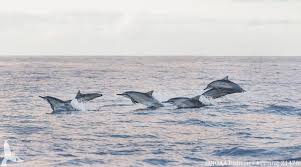Posts

Breaking the Dogma: Uncovering a New Pathway in Microbial Ethane Degradation
Researchers at the Max Planck Institute for Marine Microbiology have uncovered a surprising mechanism for the anaerobic oxidation of ethane, challenging established ideas in biochemistry. Their study, published in Nature Communications, reveals that certain deep-sea microbes use an alternative electron acceptor, F420, in place of the commonly assumed ferredoxin. This discovery sheds light on the microbes' role in the carbon cycle and underscores the need to understand their metabolism, which plays a crucial role in limiting alkane pollution.
Mayur_Tembhare

Dolphins’ Sensitivity to Military Sonar: New Study Reveals Surprising Findings
Oct. 24, 2024, 10:55 p.m.
Mayur Tembhare

University of Oxford Research Highlights Ocean Connectivity as Key to Fish Abundance in the Western Indian Ocean
Oct. 19, 2024, 4:24 a.m.
Mayur Tembhare

The relationship between active areas and boundaries with energy input in snapping shells
April 5, 2022, 7:27 p.m.
Mayur Tembhare

Squid recorded color-matching substrate for the first time
April 5, 2022, 4:20 p.m.
Mayur Tembhare

African network protects key turtle sites
March 31, 2022, 9:38 p.m.
Mayur Tembhare
About Educracypedia

Educracypedia is a research news site that covers stories in the field of science and technology. The site is dedicated to providing accurate and up-to-date information on the latest scientific discoveries, and also offers opinion pieces on current affairs within the scientific community.